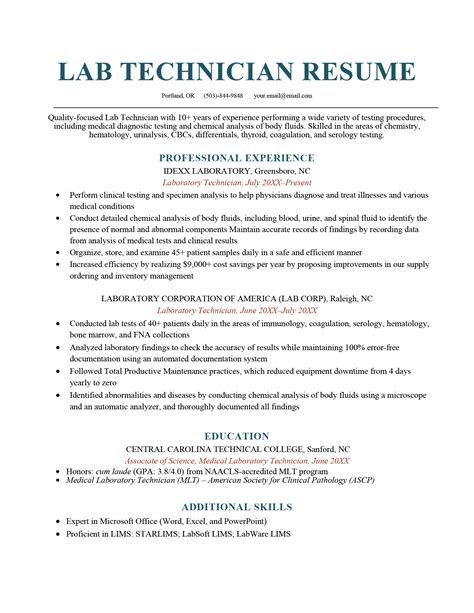Learn key skills, work experience, education/certification requirements, and tips for writing a strong lab tech resume. Perfect your resume with expert advice.Are you interested in pursuing a career as a laboratory technician? Crafting a strong resume is essential to landing your dream job in this competitive field. In this blog post, we’ll provide you with a comprehensive guide on how to create a standout laboratory technician resume. From highlighting your key skills to detailing your work experience and education, we’ll cover all the essential components that employers look for in a top-notch resume. You’ll also find valuable tips and insights on how to effectively showcase your abilities and qualifications, as well as a sample work experience section to inspire and guide you as you draft your own resume. With our guidance, you’ll be well-equipped to create a compelling resume that grabs the attention of hiring managers and sets you on the path to success as a laboratory technician.
Key Skills for Lab Technicians
In order to be a successful lab technician, there are several key skills that are essential for the job. One of the most important skills is attention to detail, as lab technicians are often responsible for conducting precise experiments and recording accurate data. Additionally, strong analytical skills are crucial for interpreting test results and troubleshooting any issues that may arise during experiments. Another important skill for lab technicians is organization, as they are often juggling multiple projects and need to keep detailed records of their work.
Technical proficiency is also a vital skill for lab technicians, as they need to be knowledgeable about various laboratory equipment and software. This includes understanding proper safety protocols and procedures for handling hazardous materials. Effective communication is another key skill, as lab technicians often work as part of a team and need to clearly convey their findings and collaborate with colleagues.
Problem-solving and critical thinking are also important skills for lab technicians, as they may encounter unexpected challenges or anomalies in their experiments. Being able to quickly assess and address these issues is crucial for maintaining the integrity of the research. Lastly, adaptability and the ability to work under pressure are essential for lab technicians, as they may need to adjust to changing deadlines or unexpected changes in experimental protocols.
Sample Work Experience for Resume
When writing a resume for a laboratory technician position, it’s important to highlight your relevant work experience. Employers are looking for candidates who have practical experience in a laboratory setting, so be sure to include any relevant work history in this area. For example, if you have worked as a research assistant, a lab assistant, or in a similar role, be sure to include this experience on your resume. Highlighting your work experience will show potential employers that you have the necessary skills and knowledge to excel in a lab technician role.
In addition to your lab-specific work experience, it’s also important to highlight any general work experience that demonstrates your transferable skills. For example, if you have experience working in a customer service role, this can demonstrate your ability to communicate effectively and work well with others. Similarly, experience in a data entry or administrative role can showcase your attention to detail and ability to manage information effectively. Including these types of work experience on your resume can help to paint a more comprehensive picture of your skills and capabilities.
Finally, when listing your work experience on your resume, be sure to provide specific examples of your responsibilities and accomplishments in each role. This can help to provide potential employers with a better understanding of the scope of your previous positions and the results you were able to achieve. By providing concrete examples of your work experience, you can demonstrate your value as a candidate and set yourself apart from other applicants.
Education and Certification Requirements
Education and Certification Requirements
Education Requirements: To become a laboratory technician, a minimum of a high school diploma or equivalent is typically required. However, many employers prefer candidates with an associate’s degree in medical laboratory technology or a related field. Some positions may even require a bachelor’s degree in medical technology or life sciences.
Certification Requirements: While certification is not always mandatory, it can greatly improve job prospects and earning potential. The most widely recognized certification for laboratory technicians is the Medical Laboratory Technician (MLT) certification offered by the American Society for Clinical Pathology (ASCP). This certification requires completion of an accredited MLT program and successful performance on a national exam.
Continuing Education: Once employed, laboratory technicians may be required to complete a certain number of continuing education credits to maintain their certification. These credits can be obtained through workshops, seminars, online courses, or other professional development activities related to the field of laboratory technology.
Tips for Writing a Strong Lab Tech Resume
When it comes to crafting a strong resume for a laboratory technician position, there are several key factors to keep in mind in order to stand out to potential employers. One important aspect is to highlight your key skills that are relevant to the job. This can include proficiency in various laboratory techniques, attention to detail, and strong analytical abilities. It’s also important to showcase any sample work experience you have in the field, whether it’s through internships, volunteer work, or previous employment. Additionally, detailing your education and certification is crucial, as these are often mandatory requirements for lab technician roles. Lastly, it’s important to follow some key tips for writing a strong lab tech resume, such as tailoring your resume to the specific job description, using action verbs to demonstrate your accomplishments, and keeping the formatting clean and easy to read.
